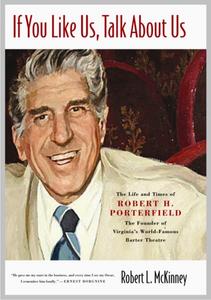

Editor's Note: Once Porterfield reaches adulthood in the book, his biography is like a "page-turner." You want to see if the next obstacle can be surmounted so that Porterfield's dream will survive -- a tornado, the Great Depression, WWII, the pull of Hollywood and Broadway, Abingdon preachers opposed to "the devil's work," embezzlement, jealous employees, the separation from and death of his first wife, financial struggles, and more.
At long last, someone has written a book that attempts to capture the charm, drive, energy and charisma of local hero and legend, Robert Porterfield, the founder of Virginia's world-famous Barter Theatre. Robert L. McKinney's biography of Porterfield, If You Like Us, Talk About Us, manages to paint a realistic and true-to-life picture of the man who brought imagination and theatrical magic to the hills and valleys of Southwest Virginia. Some sort of biography paying tribute to Porterfield is long overdue. In no way does McKinney attempt to turn Porterfield into a saint. He presents Porterfield's slightly larger-than-life persona accurately.
One reason for the overall success of that depiction is McKinney's willingness to allow Porterfield to speak for himself. This is made possible by quoting large passages from an unpublished autobiography by Porterfield, probably written in the early 1960s. Consequently, these passages resonate with Porterfield's true voice and bring his energy, inspiration, and convictions to what, otherwise, might have been simply a chronology. Evidently, there are presently no plans to publish Porterfield's Patron Saint of the Impossible. That title is a reference to St. Rita, a small statue given Porterfield by actress Jane Cowl in reference to his plan for a bartering theatre.
In the course of writing about Porterfield -- his boyhood in Saltville, the family home in Glade Spring, then the struggles to found and keep Barter Theatre going during its early years-- one fact emerges that is often overlooked. By the 1930s, Porterfield was not simply a local personality. He had been a successful actor before the Great Depression and could have had a career in films after World War II. In fact, Porterfield was a major personality in the larger world of theatrical entertainment away from and outside of Southwest Virginia. He worked on stage, on screen, and in radio, but of course, here in our area, we view his crowning achievement as the organization of the Barter Theatre.
McKinney's biography makes Porterfield accessible to audiences who might know him only from the tag line of his curtain speech -- "If you like us, talk about us. If you don't, just keep your mouth shut" -- and the handsome portrait of him that hangs in the Barter. The book also discusses the reasons, other than food and eating, that caused Porterfield to return home to Southwest Virginia to pursue a theatrical career -- a place far removed from the Mecca of all things theatrical, New York City.
Of course, in addition to McKinney's book, Porterfield lives on in the films that he made. Sergeant York aired on TCM (Turner Classic Movies) a few weeks ago and, without even seeing what was playing, that distinctive and unforgettable voice was recognizable from two rooms away. The films show the talent and work of the man, but only reveal the character he portrayed.
McKinney's biography attempts to bring the real man to the reader. He also reminds us that Porterfield, because of his contacts and theatrical reputation, was able to bring real glamour to the area, importing as he did stars from all areas of drama. Actors, playwrights, technicians, and designers were all honored and anxious to visit Barter, and so were famous folk and politicians of the day. In addition to the recognized stars he brought here, Porterfield also trained young folks who left to become stars themselves.
Essentially a very nice tribute to Porterfield, the biography has one primary weakness: what may be viewed as a tendency to run out of steam once Porterfield gets the Barter established. Various awards and honors are recounted, but we miss Porterfield's voice. That is one reason why it would have been wonderful to have had a biography written 35 years ago when men like Owen Phillips and Rex Partington were still living and telling heart-warming stories about Porterfield. Since, however, the number of people who knew Porterfield is narrowing, McKinney seems to have gathered material from some of the best remaining sources.
The book is a credit to all concerned. It should have wide appeal for a variety of readers and fills an empty niche in the world of theatre history. It is too bad, in a way, that it will probably limit itself and its distribution to this area alone. It is a book that needs to be distributed widely since, to all intents and purposes, it tells the story of regional theatre.
About the reviewer: Alan Pickrell lives in Abingdon and is professor emeritus of theatre at Emory & Henry College. He says, "I knew Robert Porterfield slightly, and admired him mightily."
About the author: Robert McKinney holds a bachelor of science degree in forestry from West Virginia University and a master of professional writing from the University of Southern California. He is an active member of the Outdoor Writers Association of America and a senior contributing editor for Sporting Classics magazine. He has been reviewing theatre for the Bristol Herald Courier for more than a decade. A native of Southwest Virginia, he is an award-winning freelance writer and photographer.